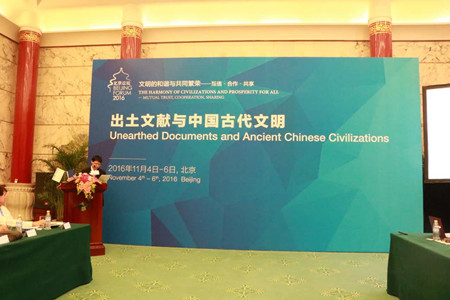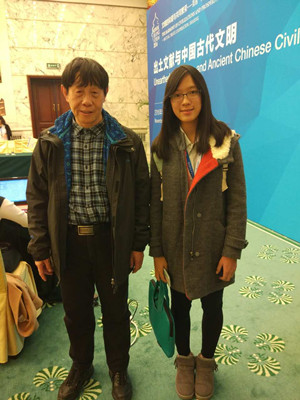Peking University, Nov. 5, 2016: On the afternoon of November 4th, 2016, the first panel session concerning unearthed documents and ancient Chinese civilization was held in Four Seasons Hall, Villa 2 in Diaoyutai State Guest House. Cheung Kwong Yue, Edward L. Shaughnessy, Kotera Atsushi, Sin Chou-Yiu, Zhu Fenghan and Li Ling made keynote speeches during the panel session.

The panelsession concerning ancient Chinese civilization
Cheung Kwong Yue talked about the importance and implications of the archery culture in light of the expression “yijie猗嗟” in the “Kongzi Shi Lun孔子诗论”, which was based on Bamboo-strip Manuscript from the Shanghai Museum Collection.
Then Edward L. Shaughnessy talked about the Tsinghua Manuscript “Zheng Wen Gong wen Taibo郑文公问太伯” and explained the question of the production of Manuscripts in early China. When he was asked why he devoted himself so much to ancient Chinese civilization by PKU News journalist, he replied that it was because his passions were kindled during the procedure and he found that regional culture could have a marvelous attraction. He mentioned that he also made explorations concerning “Jin Wen Shangshu今文尚书” and “Gu Wen Shangshu古文尚书”.
The following lecture was given by Kotera Atsushi, a Japanese professor. He talked about women in the Bamboo-strip Manuscript “Xinian系年” from the Tsinghua University Collection. He mentioned that there were not so many records of women in “Xinian系年” . But no matter the history granted a positive or negative evaluation to these women, they played a key role in shaping the fate of a country, though they were usually depicted as minor characters. He took Baosi(褒姒) and Liji(骊姬) as examples.
Sin Chou-Yiu then talked about the dialect theory raised in Karlgren’s “On the Authenticity and Nature of the Tso Chuan” in light of Unearthed Manuscripts. He first noted that many evidences showed that the author of Tso Chuan might not be Zuo Qiuming in The Analects. And whether Tso Chuan was composed before the Warring States Periods also remained a contradictory issue. Later researchers like Hu Shi also put forward their arguments. Sin Chou-Yiu concluded that though Karlgren’s essay entitled “On the Authenticity and Nature of the Tso Chuan” did not give us a settled answer, it provided many precious methods of research for latter academic reference.
Professor Zhu Fenghan then gave a lecture on the identity of the occupants in the cemetery of the State of Zeng. He tried to explore the identification of the owner of cemeteries in the State of Zeng from a logical perspective. With many geographical paintings and historical explanations, he made data applied in his lecture vivid and authentic. He led us to pay special attentions to three important historical events in this period, which were that Emperor Wu overthrew Shang Dynasty with the help of Nangong Kuo (南宫括),Duke Nan was once responsible for dealing with barbaric areas along River Huai, and Kingdom Chou once depended on the State of Chu to squeeze out a way of survival. Finally, he gave three versions for the owners of cemetery M111, M28 and M65 with regard to the information mentioned above. He concluded that each of these three versions was only a possibility, with no adequate evidence to promise its authenticity.
The final lecturer was given by Professor Li Ling. He talked about the Qin Bamboo-Strip Manuscript “Yu Jiuce禹九策” from the Peking University Collection. He first referred to a well-known literary quotation, King Yu tamed the flood. The rivermouth of Yu (禹门口) and Ba Gua Jing(八卦镜) in Tang Dynasty both added to the significance of “Yu Jiuce禹九策”. He then explained briefly the method taken in divination by means of the Eight Diagrams. He noted that a divinatory symbol with odd numbers represented good luck, while those with even numbers represented misfortunes. At that time, divination played an important role in society and even decision made by emperor may be affected by it, so the understanding of Yu Jiuce would greatly help the study on ancient culture and social activities. From his perspective, Chou Yi (周易) and Yu Jiuce(禹九策)shared many things in common and the exploration of them could be rather fascinating. He also mentioned that the rhyming of Yu Jiuce makes it easier for understanding and that the single-sentence pattern may contribute to the form of chiamsy later.
After the panel session, journalists from PKU News gave a short interview to Professor Li Ling. He remarked that he had nothing in particular as a scholar except that he always had ceaseless passions for ancient Chinese studies, and that he took his studies as an access to ancient culture, a pleasure rather than a tough job. He wished those who had the willingness to be devoted into this area could be persistent with their research, and that their hard work would definitely turn out as a great pleasure and comfort.

 With student journalists
With student journalists
Reported by: Wang Chutong / Zhou Yijing
Edited by: Zhang Jiang


